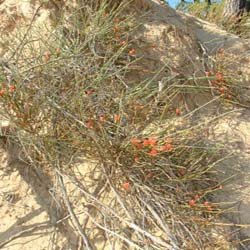|
Ephedra
Introduction[Top] Ephedra sinica is also known as Chinese-ephedra and ma huang. It is native to Mongolia and Central Asia. The main active ingredient is ephedrine. Ephedrine is a compound, which powerfully stimulates the heart and nervous system. What ma huang is used for[Top] Ma huang is used in Chinese medicine; in fact, it has been used for over five thousand years in China as well as India.In Chinese herbology, it is used in numerous herbal formulas to treat flu's and colds. Other species belonging that belong to the ma huang family have been historically used for numerous medicinal purposes. Mormon pioneers as well as Native Americans drank a tea, which was brewed from the Ma huang family called Mormon Tea How ma huang is used[Top] The leaves as well as the dried stems are used to make tablets, capsules, teas, tinctures and extracts. Science Says[Top] Ephedra contains the chemical ephedrine, which appears to cause weight loss when used in combination with caffeine. Based purely on available scientific evidence, ma huang when combined with caffeine seems to cause weight lose. Results without caffeine are not clear. Cautions and side effects[Top]
Back to natural healing home page
|
Loading



